Solar water heaters are an innovative technology that harnesses the power of the sun to heat water. They are a type of solar thermal system, which means they use sunlight to generate heat. This heat is then transferred to water, which can be used for various domestic purposes such as bathing, washing, and cooking.
The concept of solar water heating is not new. It has been in use for centuries, with early civilizations using simple methods to heat water using sunlight. However, modern solar water heaters are much more efficient and reliable, thanks to advancements in solar technology and materials science.
There are two main components in a solar water heater: the solar collector and the storage tank. The solar collector is the part that captures sunlight and converts it into heat. The storage tank is where the heated water is stored for later use. The system can be installed on the roof of a building, where it can get maximum exposure to sunlight.
Our Top Solar Water Heater Picks
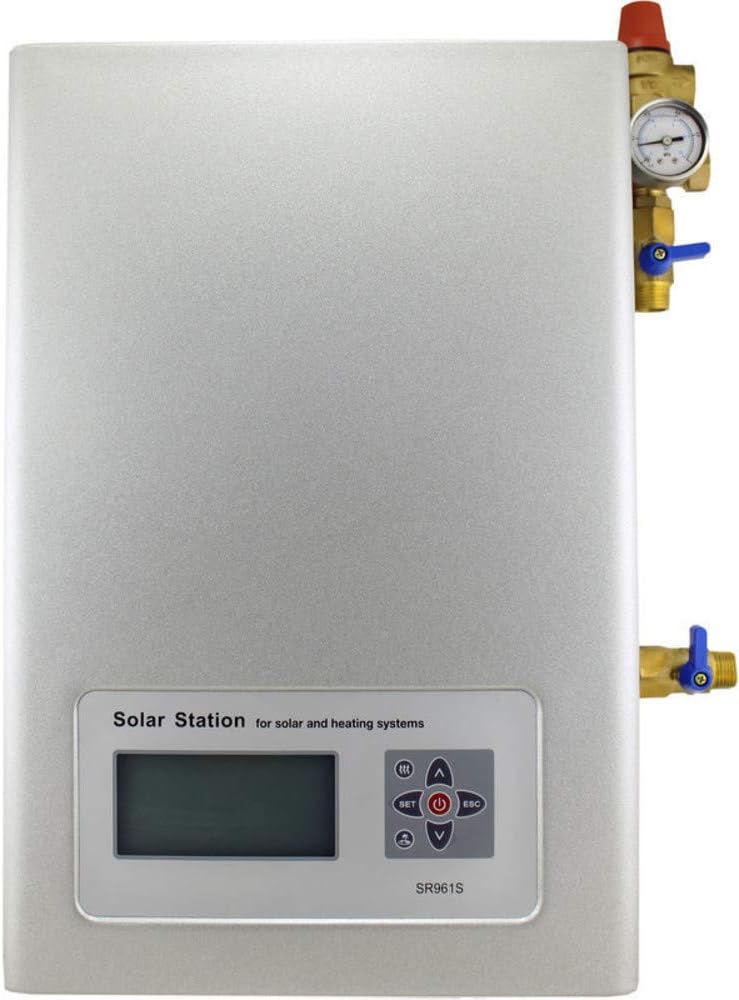
Duda Solar SR961s Working Station for Solar Water Heaters
Check on Amazon
Key Specs
- Wattage: 4 watts
- Maximum Flow Rate: Customizable through digital control
- Features: Timed heating, max temp shut-off, vacation mode, anti-freeze mode
- Color: Silver/Gray
- Technology: Intelligent fully enclosed system
The Duda Solar SR961s Working Station is a sophisticated and highly efficient system designed for solar water heaters. Its intelligent fully enclosed station offers a range of advanced features, including timed heating, maximum temperature shut-off, and vacation mode for optimal energy conservation and safety. The anti-freeze mode ensures protection during colder weather, while the digital flow rate control provides precise adjustments for consistent performance. This station combines convenience, efficiency, and smart technology to make solar water heating even more reliable and user-friendly.
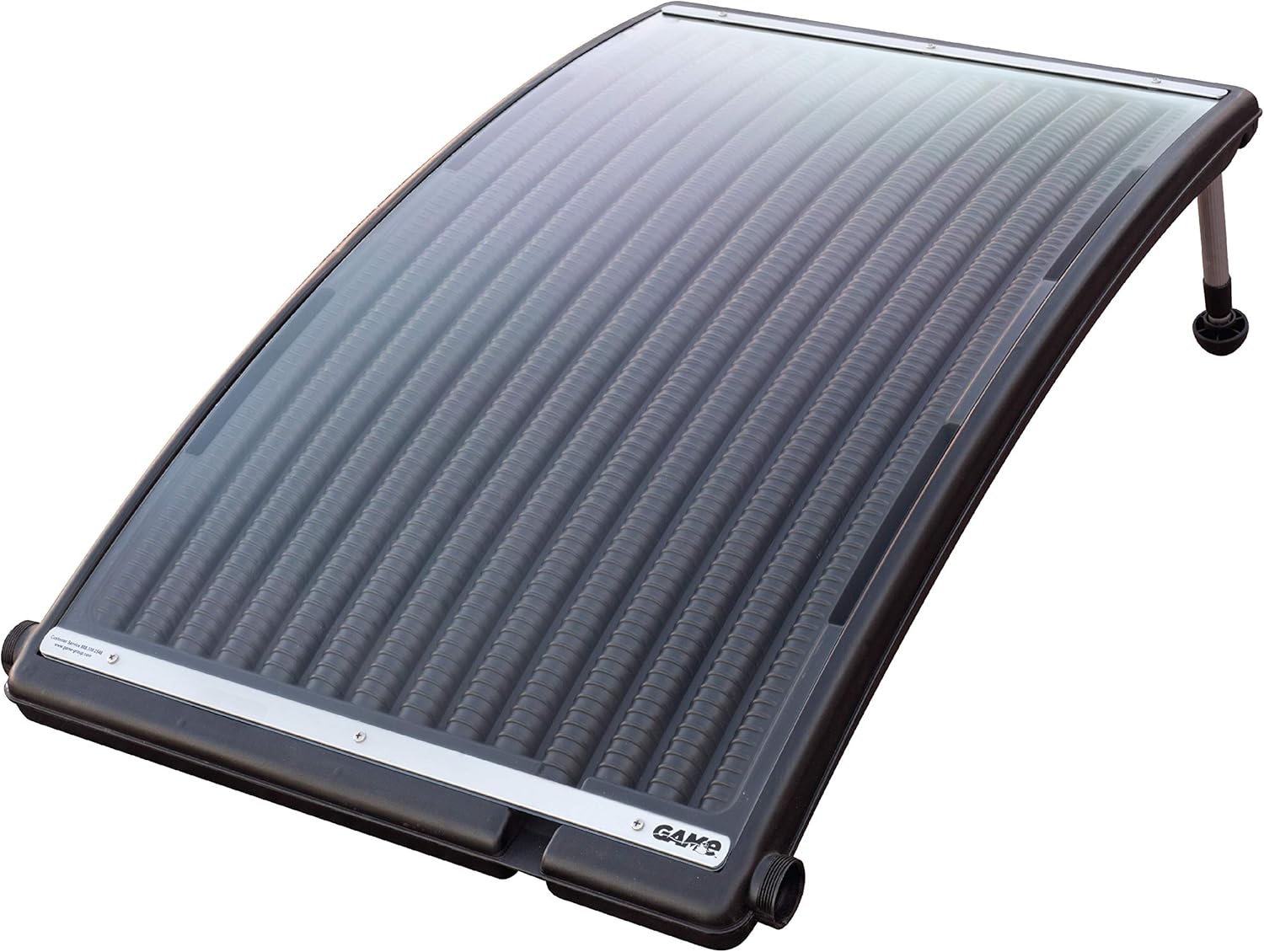
GAME 4721-BB SolarPRO Curve Solar Pool Heater
Check on Amazon
Key Specs:
- Temperature Increase: 5 degrees in 4 days for an 8,000-gallon pool
- Construction: Durable, high-quality materials
- Shape: Curved for maximum heat collection
- Compatibility: Works with Intex, Bestway, and most above/inground pools
- Features: Adjustable, foldable legs for optimal sun exposure
The GAME 4721-BB SolarPRO Curve Solar Pool Heater is an excellent solution for anyone looking to extend their pool season without the high energy costs. It efficiently raises the pool temperature by 5 degrees in 4 days for an 8,000-gallon pool. Its durable construction ensures longevity, even in harsh outdoor conditions. The unique curved shape optimizes heat collection, while the adjustable legs provide flexibility for sun exposure. Ideal for gradual temperature increases, it enhances comfort while saving space.
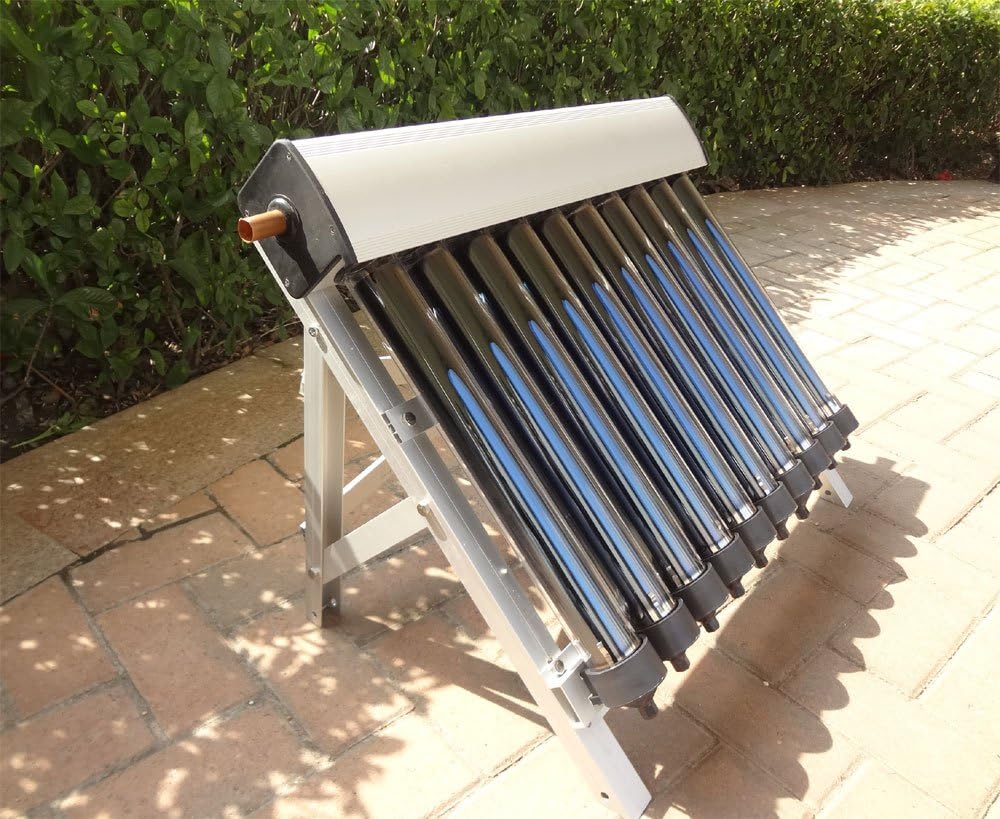
MISOL Solar Collector of Solar Hot Water Heater
Check on AmazonKey Specs:
- Vacuum Tubes: 10 tubes, each 58mm in diameter, 500mm in length
- Manifold Material: Aluminum alloy with 1.8mm thickness
- Insulation: Rock wool layer for improved heat retention
- Included Components: 10 heat pipes for tube compatibility (58*500mm)
- Applications: Home water heating, training, or demonstration projects
The MISOL Solar Collector for Solar Hot Water Heater is a versatile and efficient solution for harnessing solar energy for water heating. Equipped with 10 vacuum glass tubes, each with a diameter of 58mm and a length of 500mm, it delivers reliable performance in various applications. The manifold is constructed from durable aluminum alloy, with a thickness of 1.8mm, and features an insulating layer made of rock wool for superior thermal efficiency. This collector is ideal for small home water heating systems, training projects, or as a demonstration collector.
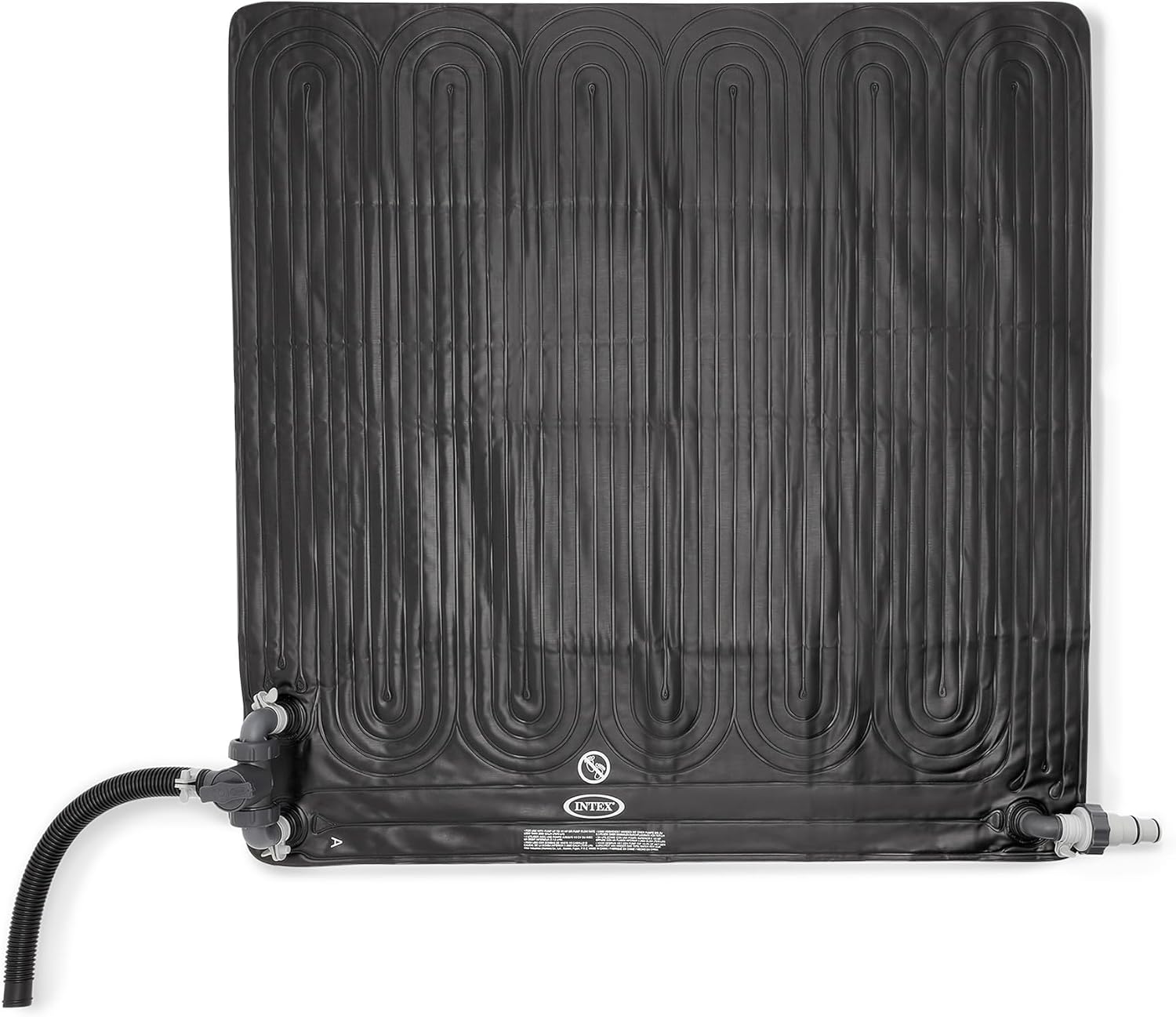
Intex 28685E 47 Inch x 47 Inch Solar Pool Water Heater
Check on Amazon
Key Specs:
- Temperature Increase: 5 to 9 degrees depending on weather
- Surface Area: 11 square feet
- Compatibility: Works with pumps up to 1/3 HP or flow rate less than 2,000 GPH
- Material: Heavy-duty UV stabilized PVC
- Storage: Folds for compact winter storage
The Intex 28685E 47 Inch x 47 Inch Solar Pool Water Heater is a smart and economical choice for increasing the temperature of your pool water by approximately 5 to 9 degrees, depending on weather conditions. With an 11-square-foot surface area, it efficiently absorbs solar energy to warm up above-ground pools. Its UV stabilized PVC construction ensures durability, while the compact design makes it easy to store during winter. It’s compatible with pumps up to 1/3 HP and can heat pools up to 8,000 gallons.
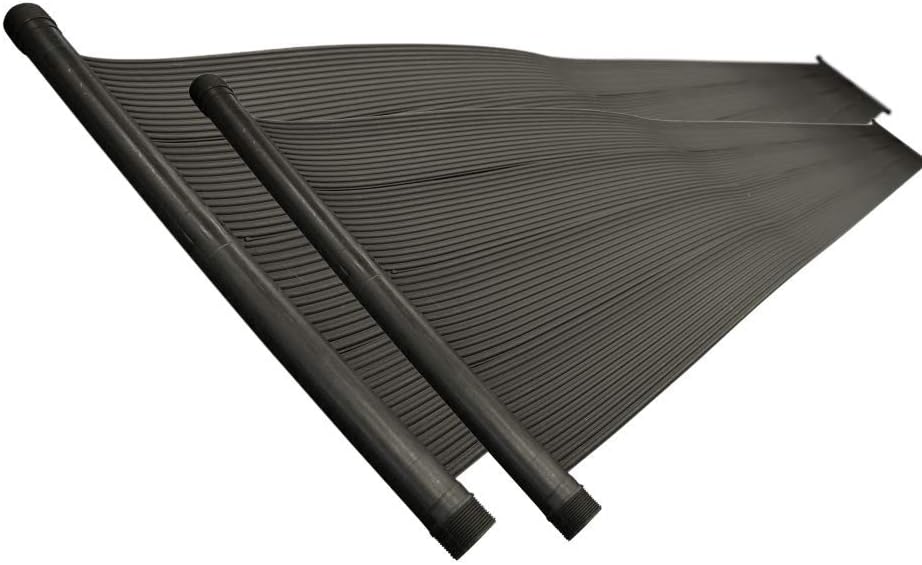
SunHeater Pool Heating System Two 2’ x 20’ Panels – Solar Heater
Check on Amazon
Key Specs:
- Panel Dimensions: Two 2-ft x 20-ft panels
- Compatibility: For pools up to 24-ft round or 12-ft x 24-ft oval/rectangle
- Temperature Increase: Up to 10 degrees F
- Material: UV-stabilized polypropylene
- Warranty: 5-year manufacturer’s warranty (requires product registration)
The SunHeater Solar Pool Heating System is an exceptional solution for extending your swimming season at no cost to you. By using your existing pool pump, it circulates water through two 2′ x 20′ solar panels, heating it with the power of the sun. This system can raise the water temperature by up to 10 degrees F, allowing you to enjoy warmer, longer swims. Its easy DIY installation and durable polypropylene construction make it a reliable and energy-efficient choice for above-ground pools.
Importance of Sustainable and Efficient Energy Sources
As the world grapples with the challenges of climate change and energy security, the importance of sustainable and efficient energy sources cannot be overstated. Solar water heaters represent a significant step in this direction, offering a clean, renewable, and abundant source of energy for heating water.
Unlike conventional water heaters that rely on fossil fuels or electricity, solar water heaters use sunlight, which is free and inexhaustible. This not only reduces our dependence on non-renewable energy sources but also helps in reducing greenhouse gas emissions, thereby contributing to the fight against global warming.
Moreover, solar water heaters are highly efficient. They can convert up to 80% of the sunlight they receive into heat, making them one of the most efficient forms of solar energy. This high efficiency, coupled with the low operating and maintenance costs, makes solar water heaters a cost-effective solution for water heating.
Understanding Solar Water Heaters
Basic Functioning of Solar Water Heaters
Solar water heaters work on a simple principle: they capture sunlight and convert it into heat, which is then used to heat water. The process begins when sunlight hits the solar collector. The collector absorbs the sunlight and converts it into heat. This heat is then transferred to the water through a heat exchanger.
The heated water is then stored in the storage tank, ready for use. The system is usually equipped with a backup heater, which can be used on cloudy days or during the night when there is no sunlight. The backup heater can be powered by electricity or gas, depending on the type of system.
It’s important to note that the efficiency of a solar water heater depends on several factors, including the amount of sunlight available, the orientation and tilt of the solar collector, and the temperature of the incoming water. However, with proper design and installation, a solar water heater can provide a significant portion of a household’s hot water needs.
Different Types of Solar Water Heaters
There are several types of solar water heaters, each with its own advantages and disadvantages. The most common types are passive systems and active systems.
Passive systems rely on natural convection to circulate water through the system. They are simple, reliable, and relatively inexpensive. However, they are not as efficient as active systems and may not be suitable for colder climates.
Active systems, on the other hand, use pumps and controllers to circulate water through the system. They are more efficient and versatile than passive systems, but they are also more complex and expensive.
Within these two broad categories, there are several specific types of solar water heaters, including flat plate collectors, evacuated tube collectors, and thermosiphon systems. Each type has its own strengths and weaknesses, and the choice of system depends on factors such as the local climate, the available sunlight, and the specific hot water needs of the user.
The Efficiency of Solar Water Heaters
How Solar Water Heaters Save Energy
Solar water heaters are highly efficient devices that can save a significant amount of energy. They achieve this efficiency through a combination of factors.
Firstly, solar water heaters use sunlight, which is a free and abundant source of energy. This means that once the system is installed, the energy used to heat the water is essentially free. This can result in significant savings on energy bills, especially in regions with high sunlight availability.
Secondly, solar water heaters are designed to capture and convert a high percentage of the available sunlight into heat. Modern solar collectors are highly efficient and can convert up to 80% of the sunlight they receive into heat. This high conversion efficiency means that a solar water heater can provide a significant portion of a household’s hot water needs, even in regions with moderate sunlight availability.
Comparison of Efficiency Between Solar Water Heaters and Traditional Heaters
When compared to traditional water heaters, solar water heaters are significantly more efficient. Traditional water heaters, whether they are powered by electricity or fossil fuels, have several inefficiencies that solar water heaters do not have.
For example, electric water heaters convert electricity into heat, a process that is inherently inefficient. In addition, the electricity used by these heaters is often generated from fossil fuels, which adds another layer of inefficiency and environmental impact.
Fossil fuel-powered water heaters, on the other hand, burn fuel directly to heat water. While this process is more efficient than converting electricity into heat, it still involves the burning of fossil fuels, which results in greenhouse gas emissions and other environmental impacts.
Solar water heaters, in contrast, use sunlight to heat water directly, a process that is highly efficient and environmentally friendly. They do not burn any fuel or produce any emissions, making them a superior choice in terms of both efficiency and sustainability.
Sustainability of Solar Water Heaters
Environmental Impact of Solar Water Heaters
The environmental impact of solar water heaters is significantly lower than that of traditional water heaters. This is because solar water heaters use sunlight, a clean and renewable source of energy, to heat water. They do not burn any fuel or produce any emissions, making them a sustainable and environmentally friendly solution for water heating.
By using a solar water heater, a household can significantly reduce its carbon footprint. According to estimates, a typical solar water heater can prevent the emission of about 1.5 tons of carbon dioxide per year, which is equivalent to the emissions from driving a car for about 3,000 miles.
In addition to reducing greenhouse gas emissions, solar water heaters also help in conserving water. They heat water directly, without the need for a separate boiler or heat exchanger. This means that they use less water than traditional water heaters, which can result in significant water savings over the lifetime of the system.
Contribution of Solar Water Heaters to Sustainable Living
Solar water heaters can play a crucial role in promoting sustainable living. By using sunlight to heat water, they offer a way to reduce our dependence on non-renewable energy sources and decrease our carbon footprint.
Moreover, solar water heaters are a practical and cost-effective solution for sustainable living. They can provide a significant portion of a household’s hot water needs, and they can do so at a lower cost than traditional water heaters. This makes them an attractive option for homeowners who want to live sustainably without sacrificing comfort or convenience.
Finally, solar water heaters can contribute to sustainable living by promoting energy independence. By generating their own hot water, homeowners can reduce their reliance on the grid and become more self-sufficient. This can be particularly beneficial in remote or off-grid locations, where access to traditional energy sources may be limited or unreliable.
Cost Analysis of Solar Water Heaters
Initial Investment for Solar Water Heaters
The initial investment for a solar water heater can vary widely, depending on the type of system, the size of the system, and the location. On average, a solar water heater can cost between $2,000 and $5,000, including installation.
While this may seem like a significant upfront cost, it’s important to consider the long-term savings that a solar water heater can provide. Over its lifetime, a solar water heater can save thousands of dollars in energy costs, making it a worthwhile investment for many homeowners.
Moreover, there are several incentives and rebates available for solar water heaters, which can help to offset the initial cost. These incentives can come from various sources, including federal and state governments, utility companies, and non-profit organizations.
Long-Term Savings from Using Solar Water Heaters
The long-term savings from using a solar water heater can be substantial. According to estimates, a solar water heater can save a household between $50 and $100 per month on energy bills, depending on the local climate and the household’s hot water usage.
Over the lifetime of the system, which is typically 20 to 30 years, these savings can add up to thousands of dollars. This makes solar water heaters a cost-effective solution for water heating, despite their higher upfront cost.
Moreover, solar water heaters can provide additional savings in the form of reduced maintenance and repair costs. Unlike traditional water heaters, which have several moving parts and can require frequent repairs, solar water heaters are simple and reliable, with few moving parts and low maintenance requirements.
Factors to Consider When Buying Solar Water Heaters
Size and Capacity of the Heater
The size and capacity of the solar water heater are important factors to consider when making a purchase. The size of the system should be based on the household’s hot water needs, which can be estimated based on the number of people in the household and their typical water usage.
The capacity of the system, on the other hand, should be based on the amount of sunlight available in the location. A larger system may be needed in regions with less sunlight, while a smaller system may be sufficient in regions with high sunlight availability.
It’s also important to consider the space available for the installation of the system. Solar water heaters require a sunny location, preferably on the roof, and they can take up a significant amount of space. Therefore, the available space may limit the size of the system that can be installed.
Climate and Geographical Location
The climate and geographical location are also important factors to consider when buying a solar water heater. The amount of sunlight available in the location will directly affect the performance of the system, so it’s important to choose a system that is suitable for the local climate.
In regions with high sunlight availability, a smaller system may be sufficient to meet the household’s hot water needs. In regions with less sunlight, a larger system or a system with a backup heater may be needed.
The local climate can also affect the type of system that is suitable. For example, in colder climates, an active system with antifreeze may be needed to prevent the system from freezing. In warmer climates, a passive system may be sufficient.
Energy Efficiency Rating
The energy efficiency rating of the solar water heater is another important factor to consider. This rating indicates how efficiently the system can convert sunlight into heat.
A higher efficiency rating means that the system can provide more hot water for the same amount of sunlight, which can result in higher energy savings. Therefore, it’s generally advisable to choose a system with a high efficiency rating, even if it costs a bit more upfront.
However, it’s also important to consider other factors, such as the reliability and durability of the system. A system with a high efficiency rating but poor reliability may not be a good investment in the long run.
Installation of Solar Water Heaters
Professional Installation vs. DIY
The installation of a solar water heater is a complex process that requires specialized knowledge and skills. Therefore, it’s generally recommended to hire a professional for the installation.
A professional installer can ensure that the system is installed correctly and safely, which can improve its performance and longevity. They can also help with the selection of the system, the design of the system, and the application for incentives and rebates.
However, for those who are handy and have some experience with plumbing and electrical work, a DIY installation may be an option. There are several DIY solar water heater kits available on the market, which come with detailed instructions and all the necessary parts. However, a DIY installation should only be attempted if you are confident in your abilities and willing to take on the risks.
Importance of Proper Installation for Efficiency
The efficiency of a solar water heater depends largely on its installation. A properly installed system can provide a significant amount of hot water, while an improperly installed system may not perform as expected.
The installation involves several important steps, including the positioning of the solar collector, the connection of the plumbing, and the installation of the storage tank and backup heater. Each of these steps requires careful planning and execution to ensure the optimal performance of the system.
For example, the solar collector should be positioned in a location where it can get maximum exposure to sunlight. It should also be tilted at an angle that is optimal for the latitude of the location. The plumbing should be insulated to prevent heat loss, and the storage tank and backup heater should be installed in a location where they can be easily accessed for maintenance and repairs.
Maintenance and Longevity of Solar Water Heaters
Regular Maintenance Requirements
Like any other appliance, a solar water heater requires regular maintenance to keep it running efficiently and reliably. The maintenance requirements for a solar water heater are relatively low, but they should not be neglected.
The most important maintenance task is the cleaning of the solar collector. The collector should be cleaned regularly to remove any dust or debris that may have accumulated on it. This is because dust and debris can block sunlight and reduce the efficiency of the system.
Other maintenance tasks include the inspection of the plumbing for leaks, the checking of the insulation for damage, and the testing of the backup heater for proper operation. These tasks can be done by the homeowner, or they can be performed by a professional during a regular service visit.
Expected Lifespan of Solar Water Heaters
The expected lifespan of a solar water heater depends on several factors, including the quality of the system, the quality of the installation, and the maintenance of the system. On average, a solar water heater can last between 20 and 30 years, which is comparable to the lifespan of a traditional water heater.
However, with proper care and maintenance, a solar water heater can last even longer. The solar collector, which is the most important part of the system, can last for several decades without any significant loss in performance. The storage tank and backup heater may need to be replaced after about 10 to 15 years, but this is a relatively simple and inexpensive process.
Therefore, a solar water heater can be a long-term investment that provides reliable and cost-effective hot water for many years.
Government Incentives and Rebates for Solar Water Heaters
Overview of Available Incentives and Rebates
There are several incentives and rebates available for solar water heaters, which can help to offset the initial cost of the system. These incentives can come from various sources, including federal and state governments, utility companies, and non-profit organizations.
The federal government offers a tax credit for solar water heaters, which can cover up to 30% of the cost of the system, including installation. This tax credit is available for systems installed in primary residences and second homes, but not for rental properties.
Many states also offer incentives for solar water heaters, including tax credits, rebates, and grants. The amount and type of incentives vary by state, so it’s important to check with your state’s energy office or a local solar installer for the most accurate information.
Utility companies may offer rebates for solar water heaters as part of their energy efficiency programs. These rebates can be substantial, often covering a significant portion of the cost of the system.
How to Apply for These Incentives
Applying for incentives and rebates for solar water heaters can be a complex process, but it’s well worth the effort. The first step is to find out what incentives are available in your area. This can be done by checking with your state’s energy office, your utility company, or a local solar installer.
Once you have identified the available incentives, the next step is to apply for them. This usually involves filling out an application form and providing documentation of the solar water heater installation, such as receipts and invoices. Some incentives may require an inspection of the system by a certified professional.
It’s important to apply for the incentives as soon as possible, as some of them may have deadlines or limited funding. It’s also important to keep copies of all the application materials and correspondence, in case there are any questions or issues later on.
Case Studies of Solar Water Heater Users
Success Stories of Individuals or Businesses Using Solar Water Heaters
There are many success stories of individuals and businesses using solar water heaters to reduce their energy costs and carbon footprint. These stories provide real-world examples of the benefits of solar water heating and can serve as inspiration for others considering this technology.
One such success story is that of a family in California who installed a solar water heater in their home. The system provides about 80% of their hot water needs, saving them about $30 per month on their energy bills. The family also received a federal tax credit and a rebate from their utility company, which helped to offset the cost of the system.
Another success story is that of a hotel in Florida that installed a large solar water heating system. The system provides hot water for the hotel’s laundry, kitchen, and guest rooms, saving the hotel about $15,000 per year in energy costs. The hotel also received a grant from the state’s energy office, which covered half of the cost of the system.
Challenges Faced and How They Were Overcome
While solar water heaters can provide significant benefits, they can also present challenges. These challenges can include the high upfront cost, the complexity of the installation, and the variability of the sunlight availability.
However, these challenges can be overcome with careful planning and the right resources. For example, the high upfront cost can be offset by incentives and rebates, as well as by the long-term energy savings. The complexity of the installation can be managed by hiring a professional installer, who can ensure that the system is installed correctly and safely.
The variability of the sunlight availability can be addressed by choosing a system with a backup heater, which can provide hot water on cloudy days or during the night. The system can also be sized to take into account the average sunlight availability in the location, ensuring that it can provide a sufficient amount of hot water even on less sunny days.
Future Trends in Solar Water Heating
Technological Advancements in Solar Water Heating
The field of solar water heating is constantly evolving, with new technologies and advancements making solar water heaters more efficient, reliable, and affordable. These advancements include improvements in solar collector technology, storage tank technology, and system design.
For example, new solar collector technologies are being developed that can capture more sunlight and convert it into heat more efficiently. These technologies include advanced coatings that can absorb more sunlight, and new designs that can concentrate sunlight onto a smaller area.
Advancements in storage tank technology are also being made, including new materials that can store heat more effectively, and new designs that can reduce heat loss. These advancements can improve the performance of the storage tank and extend the availability of hot water.
Finally, advancements in system design are making solar water heaters more versatile and easier to install. These advancements include modular systems that can be easily expanded or reconfigured, and integrated systems that combine solar water heating with other solar technologies, such as photovoltaics or solar cooling.
Predicted Growth and Adoption of Solar Water Heaters
The growth and adoption of solar water heaters is expected to increase in the coming years, driven by the rising energy costs, the growing awareness of climate change, and the increasing availability of incentives and rebates.
According to market research, the global solar water heater market is expected to grow at a compound annual growth rate of about 6% from 2020 to 2025. This growth will be
FAQ
What is a solar water heater?
A solar water heater is a system that uses solar energy to heat water for residential or commercial use, reducing reliance on traditional energy sources.
How does a solar water heater work?
It uses solar panels or collectors to capture sunlight, which is then converted into heat to warm the water in a storage tank.
What are the benefits of using a solar water heater?
Solar water heaters reduce energy costs, are environmentally friendly, and provide a sustainable source of hot water.
Can solar water heaters work on cloudy days?
Yes, solar water heaters can still function on cloudy days, though their efficiency is higher when there is direct sunlight.
Are solar water heaters easy to install?
Installation can be complex and requires professional help to ensure the system is set up correctly, but once installed, they are low-maintenance.
